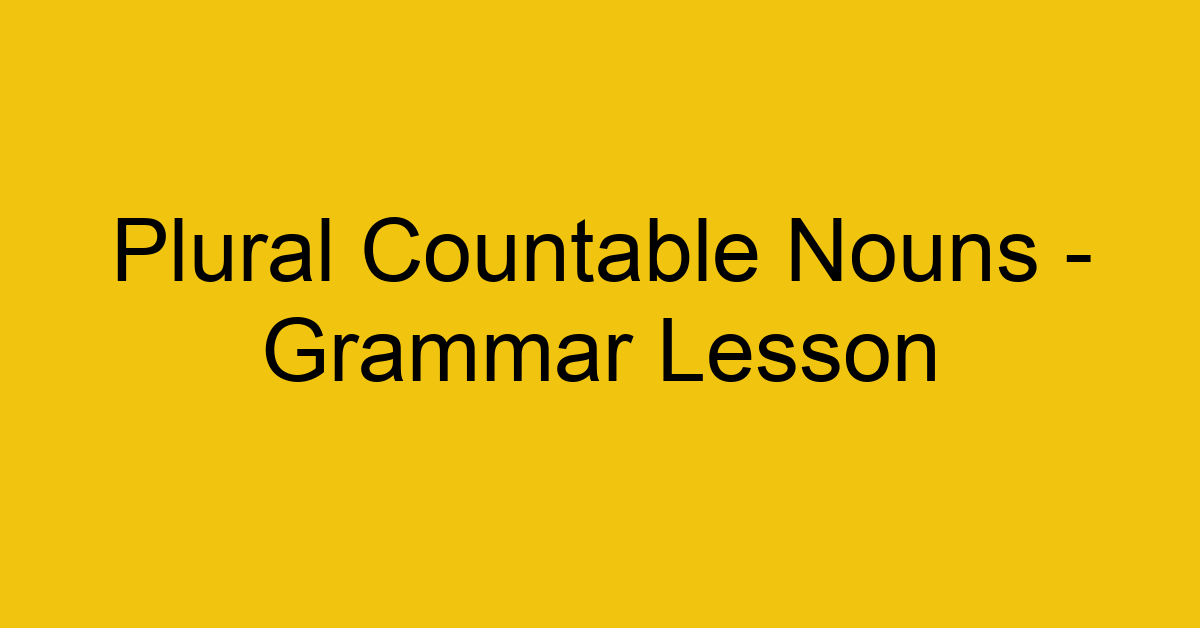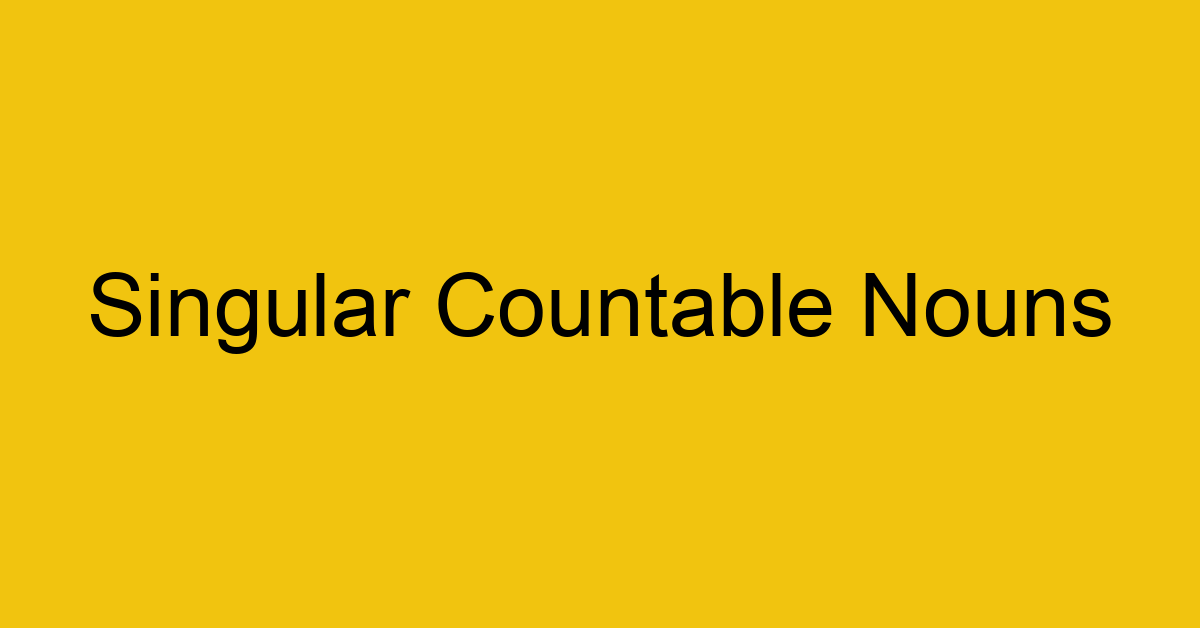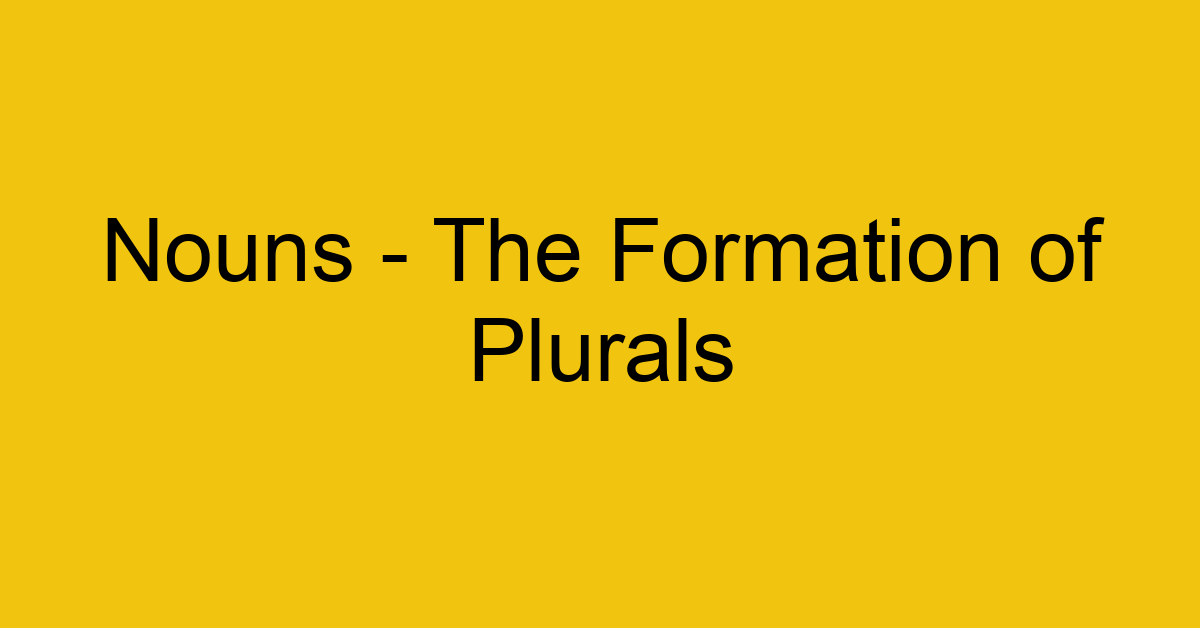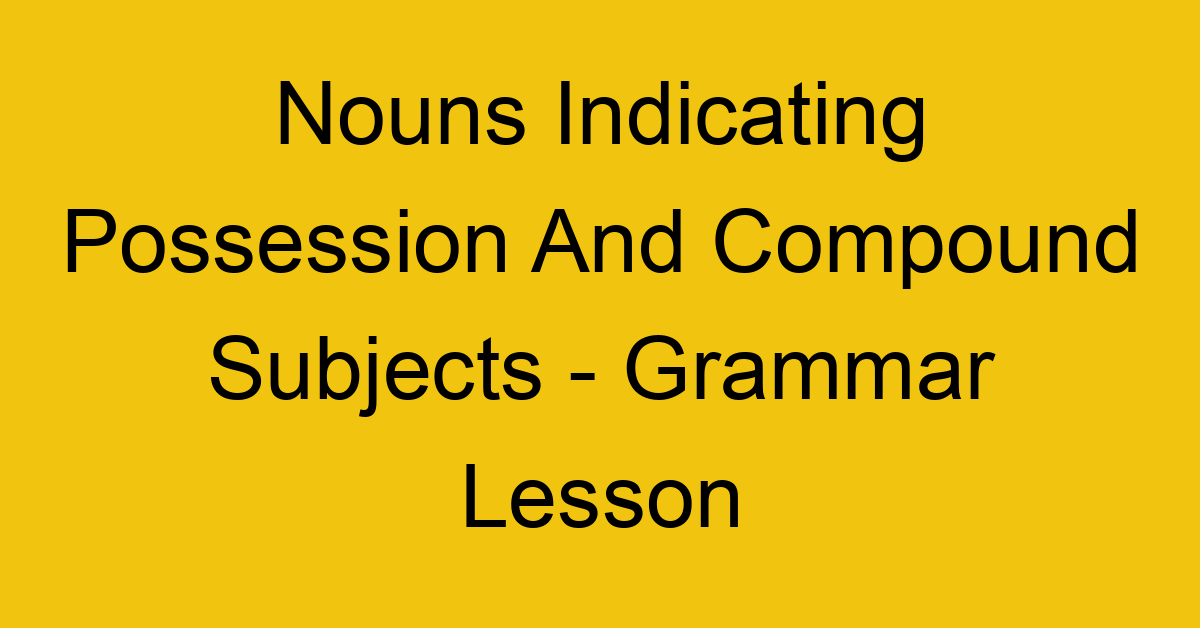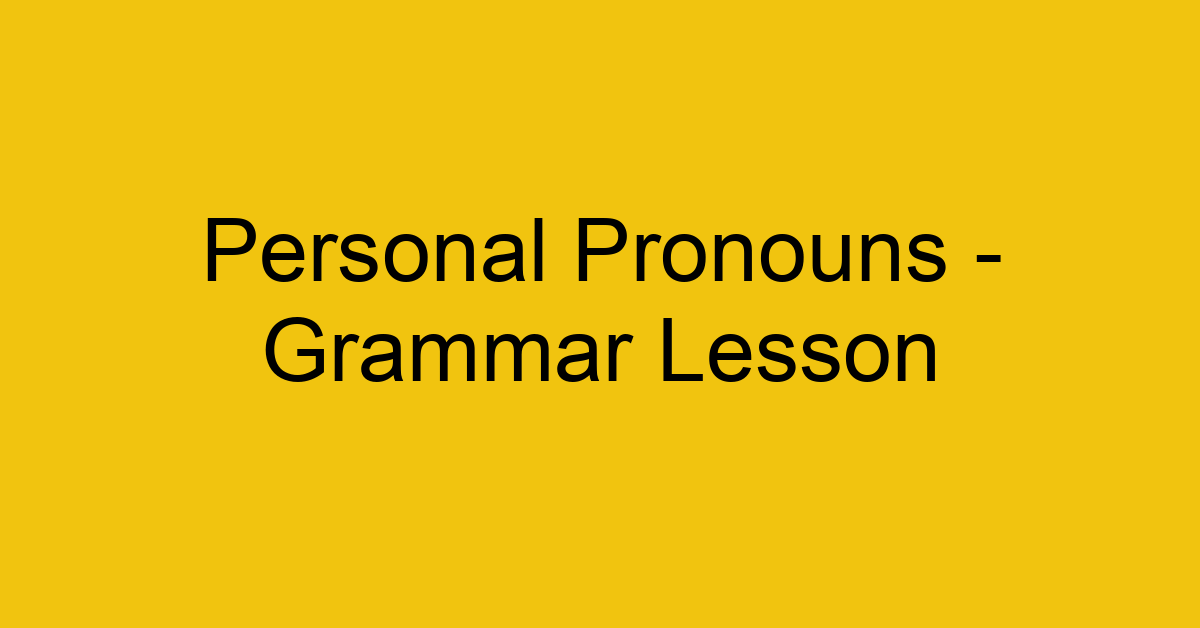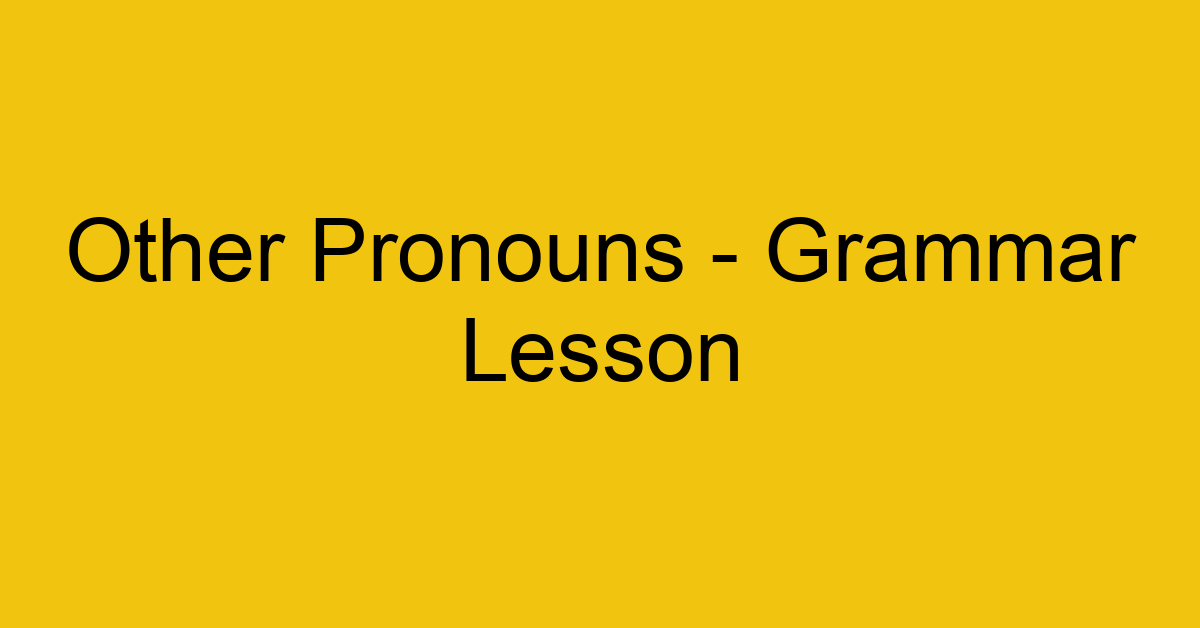CHAPTER 16. UNCOUNTABLE NOUNS
Some English nouns usually cannot form a plural or be preceded by a, an or a number. Because they usually cannot be preceded by a number, such nouns can be referred to as uncountable. English uncountable nouns include:
a) nouns naming intangible things which normally cannot be counted:
e.g. honesty
courage
impatience
b) nouns naming tangible things which are thought of as substances:
e.g. butter
milk
sand
c) nouns naming groups of things which in English are referred to collectively:
e.g. furniture
luggage
news
d) names of languages:
e.g. English
German
Spanish
An uncountable noun takes a singular verb.
e.g. Honesty is a virtue.
Butter tastes good.
Furniture was provided.
1. The absence of a determiner before uncountable nouns
a. Making a general statement
In general statements, uncountable nouns are usually not preceded by determiners. The uncountable nouns in the following general statements are underlined.
e.g. Information is often valuable.
Butter is fattening.
Courage and honesty are admirable qualities.
Sunlight and water are usually required for plants to grow.
b. Referring to something not mentioned before
In descriptions, uncountable nouns are generally not preceded by a determiner when naming something which has not been referred to previously.
e.g. Rain was forecast for the next day.
However, thunder and lightning were not expected.
Our breakfast consisted of bread, honey and marmalade.
In these examples, the uncountable nouns rain, thunder, lightning, bread, honey and marmalade are not preceded by determiners. It is assumed that the things referred to by these nouns have not been mentioned previously.
See Exercise 1.
2. The use of The before uncountable nouns
a. Referring to something mentioned before
The is used with uncountable nouns referring to things previously mentioned.
e.g. We were served bread and cheese. The bread was somewhat stale, but the cheese was delicious.
Gold was discovered in the Klondike. The gold attracted thousands of prospectors.
Furniture and clothing are being sold at the flea market. The furniture is reasonably priced, and the clothing is cheap.
In these examples, the first time the uncountable nouns bread, cheese, gold, furniture and clothing are used, they are not preceded by determiners, because the things referred to have not been mentioned previously. The second time these nouns are used, they are preceded by the, since the things referred to have already been mentioned.
See Exercise 2.
b. Referring to something when it is considered obvious what is meant
The is used with uncountable nouns when the speaker or writer considers it obvious which particular thing is meant.
e.g. The weather is fine.
The butter is hard.
The music is too loud.
The expression the weather usually refers to the local weather. The expression the butter could refer to butter which one plans to use, and the expression the music could refer to music which is playing nearby.
The is often used before uncountable nouns followed by descriptive phrases, since such phrases tend to make it clear to which particular things the uncountable nouns are referring.
e.g. The warmth of the sun causes water to evaporate.
The coal mined in Germany is used in making steel.
The milk which they produce is marketed locally.
In the first sentence, the is used with the uncountable noun warmth, since the phrase of the sun specifies what warmth is meant. In the second sentence, the is used with the uncountable noun coal, since the phrase mined in Germany specifies which particular coal is meant. In the third sentence, the is used with the uncountable noun milk, since the phrase which they produce makes it clear which particular milk is meant.
As shown in the following table, the absence of a determiner and the use of the before uncountable nouns follows a pattern similar to the absence of a determiner and the use of the before plural countable nouns.
| Use | Uncountable Nouns |
| Making a general statement | no determiner |
| Something not mentioned before | no determiner |
| Something mentioned before | the |
| When it is obvious what is meant | the |
3. The use of uncountable nouns to refer to individual things
Uncountable nouns can be used to refer to individual things by being preceded by a countable noun and the word of. For example:
| Uncountable Noun | Referring to an Individual Thing |
| information | a piece of information |
| wheat | a grain of wheat |
| milk | a glass of milk |
| sunlight | a patch of sunlight |
The countable nouns may, of course, be put into the plural. For example:
| Singular | Plural |
| one piece of information | two pieces of information |
| one grain of wheat | three grains of wheat |
| one glass of milk | four glasses of milk |
| one patch of sunlight | five patches of sunlight |
In sentences such as the following, it is the countable noun which is the subject of the verb.
e.g. Fifty grains of wheat are required.
Two glasses of milk are enough.
In the above examples, the plural countable nouns grains and glasses each take the plural verb are.
In English, the names of games are usually uncountable nouns.
e.g. He plays hockey.
Chess is a challenging game.
When it is desired to refer to individual games, the word game must usually be used. For example:
| Uncountable Noun | Referring to an Individual Thing |
| chess | a game of chess |
| hockey | a game of hockey or a hockey game |
See Exercise 3.
4. Nouns which can be either countable or uncountable
Many English nouns are used sometimes as countable nouns and sometimes as uncountable nouns. Nouns which can be either countable or uncountable include nouns which may have different shades of meaning; normally uncountable nouns which are used to refer to types of things; and a few nouns which refer to places used for specific activities.
a. Differences in meaning
Many nouns are uncountable when they refer to something as a substance or a concept, but are countable when they refer to an individual thing related to the substance or concept. For instance, cake is used as an uncountable noun when referring to cake as a substance, but is used as a countable noun when referring to individual cakes.
e.g. Cake and ice cream is my favorite dessert.
This afternoon we baked two cakes.
In the first sentence cake is an uncountable noun, and in the second sentence cakes is a countable noun.
Similarly, life is used as an uncountable noun when referring to life as an abstract concept, but is used as a countable noun when referring to individual lives.
e.g. Life is full of surprises.
It was feared that two lives had been lost.
In the first sentence life is an uncountable noun, and in the second sentence lives is a countable noun.
b. Referring to a type of something
An uncountable noun can be used as countable noun when it refers to a type of something.
e.g. He has an honesty which is rare nowadays.
The wheats of Canada differ from those of India.
In the first sentence, the usually uncountable noun honesty is used with an as a countable noun to refer to a type of honesty. In the second sentence, the usually uncountable noun wheat is used as a countable noun in the plural to refer to types of wheat.
c. Referring to places used for specific activities
A few nouns referring to places used for specific activities can be either countable or uncountable. These nouns are used as uncountable nouns when referring to places as locations where specific activities are carried out, but are used as countable nouns when referring to the places as objects. In the following pairs of sentences, the words bed and church are used first as uncountable nouns, and then as countable nouns.
e.g. Because I was tired, I stayed in bed.
Please help me to move the bed.
She goes to church.
She likes to photograph churches.
In the first pair of sentences, stayed in bed refers to the activity of resting in bed; whereas move the bed refers to a bed as an object. In the second pair of sentences, goes to church refers to the activity of taking part in church services; whereas likes to photograph churches refers to churches as objects.
Nouns which are used in this way include:
| bed | home | sea |
| church | hospital | town |
| college | prison | university |
| court | school |
d. Names of meals
Similarly, the word television and the names of meals such as breakfast, lunch, dinner and supper are used as uncountable nouns when it is desired to emphasize the activity being carried out.
e.g. They are watching television.
We are eating breakfast.
See Exercise 4.
5. Infinitives used in the place of nouns
Infinitives are sometimes used in the place of nouns.
e.g. To ski well is one of my goals.
They plan to call us.
In the first sentence, the infinitive to ski performs the function of a noun, since it is the subject of the verb is. In the second sentence, the infinitive to call performs the function of a noun, since it is the object of the verb to plan. These infinitives also function as verbs, since to ski is described by the adverb well, and to call takes the object us.
Like an uncountable noun, an infinitive which is the subject of a verb takes a singular verb. Unlike an uncountable noun, an infinitive usually cannot be preceded by the word the.
6. Gerunds
Present participles are often used in the place of nouns. A present participle used in the place of a noun is usually referred to as a gerund. In the following sentences, the gerunds are underlined.
e.g. Skating is good exercise.
They like jogging.
In the first sentence, skating is the subject of the verb is. In the second sentence, jogging is the object of the verb like.
A gerund can perform the functions of a noun and a verb at the same time.
e.g. Riding a bicycle is good exercise.
They like playing hockey.
In the first sentence, the gerund riding functions as a noun, since it is the subject of the verb is; and also functions as a verb, since it takes the object bicycle. In the second sentence, the gerund playing functions as a noun, since it is the object of the verb like; and also functions as a verb, since it takes the object hockey.
In their role as nouns, gerunds are sometimes regarded as uncountable nouns. Like an uncountable noun, a gerund which is the subject of a verb takes a singular verb. Also, like an uncountable noun, a gerund can be preceded by the when referring to a particular thing or to something previously mentioned.
e.g. The skiing was excellent.
He went hunting. The hunting was good.
In the first example, the skiing could refer to skiing done at a particular place. In the second example, the hunting refers to the hunting mentioned in the previous sentence.
7. Specific verbs followed by infinitives and gerunds
a. Verbs followed by infinitives
Many English verbs can be followed by an infinitive. In the following examples, the verbs are underlined, and the infinitives are printed in bold type.
e.g. They want to succeed.
He hopes to travel next year.
The following verbs can take an infinitive as an object, but cannot take a gerund as an object:
| agree | demand | learn | promise |
| appear | deserve | manage | refuse |
| arrange | expect | mean | seem |
| ask | fail | need | tend |
| claim | forget | offer | threaten |
| consent | hesitate | plan | wait |
| dare | hope | prepare | want |
| decide | intend | pretend |
Other examples of the use of infinitives with these verbs are:
They agreed to come.
He expected to win.
She managed to keep the secret.
We pretended to agree with them.
b. Verbs followed by either infinitives or gerunds
Some English verbs can be followed either by an infinitive or by a gerund. In the following examples, the verbs are underlined, and the infinitives and gerunds are printed in bold type.
e.g. I like to fish.
I like fishing.
She prefers to ride a bicycle.
She prefers riding a bicycle.
The following verbs can take either an infinitive or a gerund as an object:
| attempt | like |
| begin | love |
| cease | prefer |
| commence | propose |
| continue | start |
| hate | try |
c. Verbs followed by gerunds
Other English verbs can be followed by a gerund, but cannot be followed by an infinitive used as an object. In the following examples, the verbs are underlined, and the gerunds are printed in bold type.
e.g. They disliked waiting.
It stopped raining.
The following verbs can take a gerund as an object, but cannot take an infinitive as an object:
| 1 | 2 | 3 | 4 | 5 |
| keep | appreciate | admit | avoid | complete |
| practise | deplore | anticipate | defer | finish |
| risk | detest | consider | delay | quit |
| dislike | deny | escape | stop | |
| dread | discuss | miss | ||
| enjoy | mention | postpone | ||
| loathe | recall | |||
| mind | recommend | |||
| regret | suggest | |||
| resent | ||||
| resist | ||||
| tolerate |
It should be noted that many of the verbs listed above have similar meanings. The second column contains verbs which express feelings about doing something; many of the feelings are negative. The third column contains verbs which refer to thoughts about doing something. The fourth column contains verbs which refer to negative actions with respect to doing something. The fifth column contains verbs which refer to ceasing to do something.
Other examples of the use of gerunds with these verbs are:
I kept calling the office.
We appreciate hearing from you.
He denies following us.
They avoid discussing the subject.
She finished filling in the blanks.
See Exercise 5.
EXERCISES for Chapter 16
Exercise 1
For the following sentences, fill in the blanks with a or an or leave the blanks empty, as appropriate. Fill in the blanks with a or an before countable nouns, and leave them empty before uncountable nouns. For example:
__ bird is singing outside the window.
A bird is singing outside the window.
___ copper is used in making electrical wiring.
Copper is used in making electrical wiring.
- ___ air is made up of elements such as ___ oxygen and ___ nitrogen.
- ___ book is lying on the floor.
- ___ Russian is a difficult language.
- ___ onion is ___ vegetable.
- ___ butter and ___ cream are made from ___ milk.
- ___ letter has been delivered to the wrong house.
- ___ child is playing on the sidewalk.
- ___ asbestos is a fireproof material.
- ___ tree is growing outside the house.
- ___ curiosity is considered a sign of ___ intelligence.
- They want to buy ___ camera.
- ___ egg was added to the soup.
- ___ rain is expected this evening.
- The farmers wished for ___ peace and ___ prosperity.
- ___ bicycle is parked in front of the store.
Exercise 2
Paying attention to whether the nouns in the following paragraphs are countable or uncountable, and to whether or not the nouns refer to things which have been mentioned before, fill in the blanks with a or the, or leave the blanks empty, as appropriate.
Phil Jones was ____ prospector, who was looking for ____ gold. He had to travel a long way, crossing ___ mountains and ____ streams to reach his destination.
Previously, he had been ____ miner and had mined ___ copper and ___ coal. But ____ copper had given out, and mining ____ coal was dangerous work. When he had heard about ___ gold in ____ mountains, Phil had left his job and traveled west. He knew he would need ___ courage and ___ determination to reach his goal.
One evening he camped beside ___ stream. When he tested ____ stream, he found there was a small amount of glittering gold dust in it. As usual, Phil made ___ fire to prepare his evening meal. He took ____ ___ flour and ___ salt from his knapsack, and got ___ water from ____ stream. Then he mixed ___ salt with ___ flour, and gradually added ___ water, to make ___ pancakes over ___ fire.
As ___ fire died away, Phil looked up and down ___ stream. Expecting to see only ___ darkness, to his surprise, he saw ____ lights from many small fires. He knew they must be ____ fires of other prospectors. “I’ve reached end of my journey”, he thought. Now he was in the goldfields, and with ___ luck, he would find ___ gold he had come to seek.
Exercise 3
For each of the following sentences, change the word one to two, put the subject of the verb into the plural, and make sure that the verb agrees with its subject. For example:
One bar of soap will be provided.
Two bars of soap will be provided.
One bag of flour is on the counter.
Two bags of flour are on the counter.
- One piece of luggage is allowed per passenger.
- One bottle of water is enough.
- One jar of honey is larger than the others.
- One piece of furniture will be delivered.
- One grain of rice has fallen onto the table.
- One bucket of sand was needed to build the sand castle.
- One cup of sugar should be mixed with the flour.
- One game of chess will be played at four o’clock.
Exercise 4
Fill in each blank with a or an if the noun following the blank is used as a countable noun, or leave the blank empty if the noun following the blank is used as an uncountable noun. For example:
The bowl is made of ___ glass.
The bowl is made of glass.
Would you like __ glass of water?
Would you like a glass of water?
- The sun gives off ___ heat and ___ light.
- There is ___ light suspended from the ceiling.
- She will buy ___ paper to find out what movies are being shown.
- ___ paper can be made from ___ wood or ___ cloth.
- She has a keen sense of ___ honor.
- It is ___ honor to be invited to speak.
- There is ___ bed near the window.
- He has gone to ____ bed early because he is tired.
- ___ iron used in making ___ steel.
- If I had ___ iron, I would press my new suit.
- They always eat ___ lunch at twelve o’clock.
- We will pack you ____ lunch to take with you.
Exercise 5
Paying attention to which verbs can be followed by an infinitive and which can be followed by a gerund, for each sentence, fill in the blank with the infinitive or gerund of the verb shown in brackets. For example:
Please stop _____ that! (to do)
Please stop doing that!
He has decided _______ a holiday. (to take)
He has decided to take a holiday.
- Has he finished __________ the report? (to read)
- We plan __________ the concert. (to attend)
- They will discuss __________ a club. (to organize)
- She offered _________ the letter. (to write)
- They asked __________ us. (to accompany)
- You should practise __________ the speech. (to give)
- I would suggest __________ the work by next week. (to finish)
- He has not dared __________ you. (to contradict)
- They delayed _________ us. (to call)
- She deserves ___________. (to succeed)
- We forgot _________ the letter. (to mail)
- He enjoys __________. (to ski)
- They would not risk _________ the bus. (to miss)
- Do you want __________ the book? (to borrow)
- I don’t mind _________. (to wait)
- Her daughter is learning __________ a bicycle. (to ride)
- It has stopped __________. (to snow)
- He is preparing __________ a business. (to open)
- They hesitated __________ the invitation. (to accept)
- I miss __________ from them. (to hear)
ANSWERS TO THE EXERCISES for Chapter 16
Answers to Exercise 1:
1. __ Air, __ oxygen, __ nitrogen 2. A book 3. __ Russian 4. An onion, a vegetable 5. __ Butter, __ cream, __ milk 6. A letter 7. A child 8. __ Asbestos 9. A tree 10. __ Curiosity, __ intelligence 11. a camera 12. An egg 13. __ Rain 14. __ peace, __ prosperity 15. A bicycle
Answers to Exercise 2:
a prospector, __ gold. __ mountains, __ streams. a miner, __ copper, __ coal. the copper, the coal. the gold, the mountains, __ courage, __ determination. a stream. the stream. a fire. __ flour, __ salt, __ water, the stream. the salt, the flour the water, __ pancakes, the fire. the fire, the stream. __ darkness, __ lights. the fires. the end. __ luck, the gold.
Answers to Exercise 3:
1. Two pieces of luggage are allowed 2. Two bottles of water are 3. Two jars of honey are 4. Two pieces of furniture will be delivered. 5. Two grains of rice have fallen 6. Two buckets of wand were needed 7. Two cups of sugar should be mixed 9. Two games of chess will be played
Answers to Exercise 4:
1. __ heat, __ light 2. a light 3. a paper 4. __ Paper, __ wood, __ cloth 5. __ honor 6. an honor 7. a bed 8. __ bed 9. __ Iron, __ steel 10. an iron 11. __ lunch 12. a lunch
Answers to Exercise 5:
1. reading 2. to attend 3. organizing 4. to write 5. to accompany 6. giving 7. finishing 8. to contradict 9. calling 10. to succeed 11. to mall 12. skiing 13. missing 14. to borrow 15. waiting 16. to ride 17. snowing 18. to open 19. to accept 20. hearing

